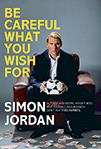 by Simon Jordan
by Simon Jordan
Yellow Jersey Press, £18.99
Reviewed by Matthew Barker
From WSC 306 August 2012
Simon Jordan has never been the easiest of people to warm to. The public perception has generally been that of a perma-tanned flash git and there is little in this book to suggest otherwise. However, plenty enjoyed those inspired rants in his short series of Observer columns (“If I see another David Gold interview on the poor East End Jewish boy done good I’ll impale myself on one of his dildos,” etc).
Anyone hoping for more of the same in this autobiography is going to be disappointed. Yes, there is some fun to be had here, but the prose can be so clunky at times, full of bland cliches and feeble geezerisms, that it is clear Jordan benefited from a decent sub-editor when it came to his newspaper work.
The arc of Jordan’s time at Selhurst Park encompasses some crucial moments, both for Crystal Palace and English football at large. Beginning with the failure of ITV Digital and ending with his club in administration nine years later, there is a simmering anger in these pages, erupting in a perfect storm after 2004’s promotion and Iain Dowie quitting after the traumas of the following season. The fallout was bitter. To prove a charge of fraudulent misrepresentation in the ensuing court case, investigators even seized the departed coach’s laptop.
Jordan is keen throughout to portray himself as the progressive young buck, kicking against the grey-haired, grey-suited establishment of club owners. Some of the promised score-settling turns out to be pretty tame. It is no great surprise that David Sullivan comes across as a nasty little man, making a point of loudly asking Jordan in the middle of the Birmingham boardroom if he was gay. The witty riposte – “Why? Do you fancy a crack at me?” – was equally crass.
Former Charlton chairman Richard Murray challenges Jordan to a fight after an invitation to lunch is turned down, while Steve Coppell, Peter Taylor and Trevor Francis are all portrayed as cheerless mopes of varying degrees. Steve Bruce, despite the whole gardening leave episode, remains “a firm friend”.
There is, as you might expect, a fair bit of bragging too. Our man flits between his “exclusive Chelsea penthouse suite” and Puerto Banus, living in a world full of “beautiful ladies”. Even more galling is his boasting about his friendship with former Wimbledon chairman Charles Koppel, a “close ally against all football bullshit”.
For all that, reading the final chapters, Jordan’s frustration and eventual weary resignation as he bemoans the grip of agents and watches as a succession of homegrown talent leaves the club, is palpable. The passages describing his attempts to avoid insolvency have a gripping inevitability; the sums of money quoted are startling and depressing. Jordan invested and lost a lot. And you have to feel for him.
Palace appear to have done better than most clubs after the shock of administration, but the game’s landscape continues to alter and present new challenges, with the Elite Player Performance Plan and Financial Fair Play both starting to kick in. Maybe Jordan should write a column about it.